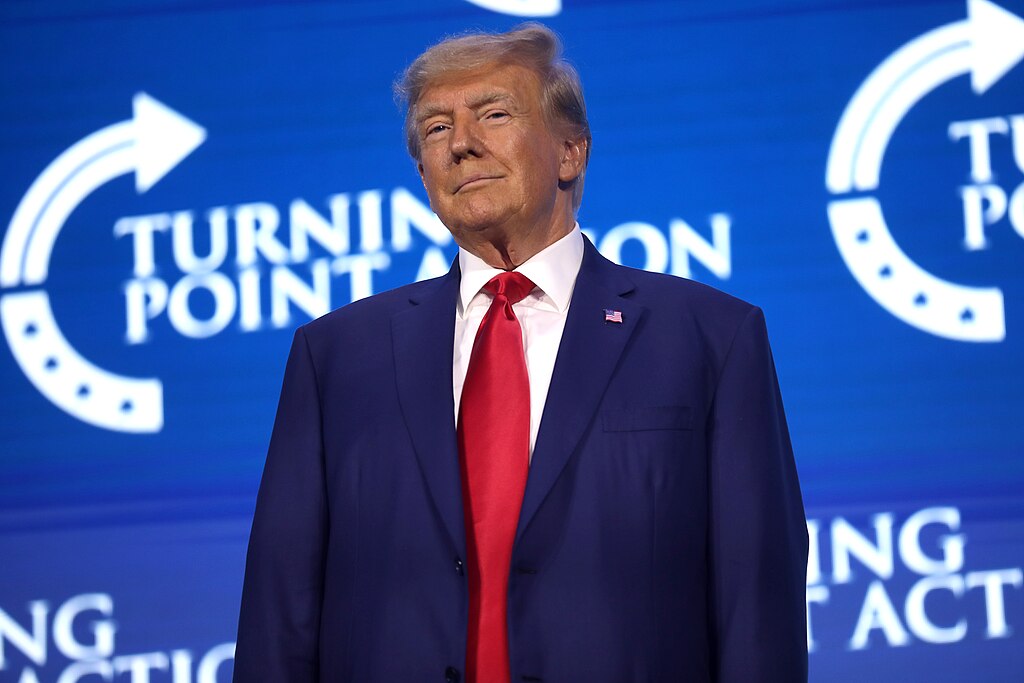Image Creator: Gage Skidmore from Surprise, AZ, United States of America, CC BY-SA 2.0, via Wikimedia Commons
WASHINGTON, D.C. – October 3, 2025 – President Trump Declares Armed Conflict with Drug Cartels, Escalating U.S. Military Role and Legal Debate, marking a potentially profound shift in U.S. engagement against transnational criminal organizations. President Donald Trump has formally declared armed conflict with drug cartels, effectively classifying members of these groups as “unlawful combatants.” This declaration, reportedly conveyed to Congress via a confidential memo, signals a radical expansion of the legal basis for U.S. military strikes against cartel operations, igniting significant legal and international debate.
The Formal Declaration: “Unlawful Combatants” and Expanded Military Authority
President Donald Trump has officially informed several congressional committees that the United States is now engaged in a formal, non-international armed conflict with drug cartels. The administration has reportedly designated specific cartels as terrorist organizations under this framework, with Venezuela’s Tren de Aragua mentioned as one such group. This classification of cartel members as “unlawful combatants” grants the U.S. military broader legal authority to directly target these groups with military force, moving beyond traditional law enforcement parameters.
This declaration follows a series of recent U.S. military strikes, reportedly conducted in the Caribbean Sea, targeting vessels suspected of transporting drugs and cartel operatives. These operations, said to have been authorized last month, reportedly resulted in the deaths of at least 17 individuals. The Trump administration asserts these actions fall within the law of armed conflict, framing them as a national security imperative to protect U.S. citizens from the flow of deadly narcotics, particularly fentanyl, rather than purely criminal law enforcement actions.
Profound Legal and International Ramifications
The legal implications of this declaration are profound and contentious. Legal experts and human rights advocates have swiftly raised concerns, stating that drug trafficking does not traditionally amount to an armed attack under international law. This classification potentially allows the U.S. to detain suspected cartel members without trial and try them in military courts, significantly expanding the scope of presidential wartime powers. Critics also question the omission of explicit Congressional authorization for these operations, highlighting possible constitutional challenges regarding the executive branch’s authority to unilaterally declare such a conflict.
Internationally, the declaration could severely strain diplomatic relations, particularly with Mexico and other Latin American nations. Historically, these nations have firmly rejected any notion of U.S. military intervention on their soil, viewing it as an infringement on their sovereignty. Such a move could undermine existing bilateral security cooperation, which is crucial for intelligence sharing and cross-border law enforcement operations. International law bodies would likely scrutinize any unilateral military actions, potentially leading to widespread condemnation and accusations of violating international law. This aggressive stance underscores how President Trump Declares Armed Conflict with Drug Cartels, setting a new precedent.
Domestic Reactions and Policy Justifications
Domestically, the declaration is expected to garner mixed reactions. The Trump administration justifies the military campaign as a continuation of its “America First” policy to protect U.S. citizens from the flow of deadly narcotics. The confidential memo reportedly highlights that these cartels possess paramilitary capabilities and operate transnationally, conducting continuous assaults across the Western Hemisphere, thereby posing a direct threat to U.S. national security.
However, political opponents in Congress and civil liberties advocates are expected to raise immediate alarms. Concerns would likely focus on the legal authority for such actions, the potential for mission creep, the risk to human rights, and the immense costs (both human and financial) of military engagement. Critics may also argue that addressing the drug crisis requires a multifaceted approach, including public health initiatives, economic development, and international cooperation, rather than solely military force.
Outlook and Evolving Developments
This development marks a significant and potentially unprecedented shift in the U.S. government’s approach to combating criminal organizations. While the White House maintains that the military actions are lawful and necessary, political opposition emphasizes the critical need for Congressional oversight for military engagements.
Coverage of this ongoing story continues to evolve as lawmakers respond to the memo, legal experts analyze its full implications, and further military actions potentially unfold. The ultimate effectiveness of treating cartels as military adversaries, rather than criminal enterprises, remains uncertain and highly debated. The move, if sustained, could reshape U.S. national security policy, its relationships with neighboring countries, and the global framework for addressing transnational crime. The full implications of President Trump Declares Armed Conflict with Drug Cartels, Escalating U.S. Military Role and Legal Debate will undoubtedly be a central point of discussion in the coming weeks and months.
This content is intended for informational purposes only and is not any kind of advice.

